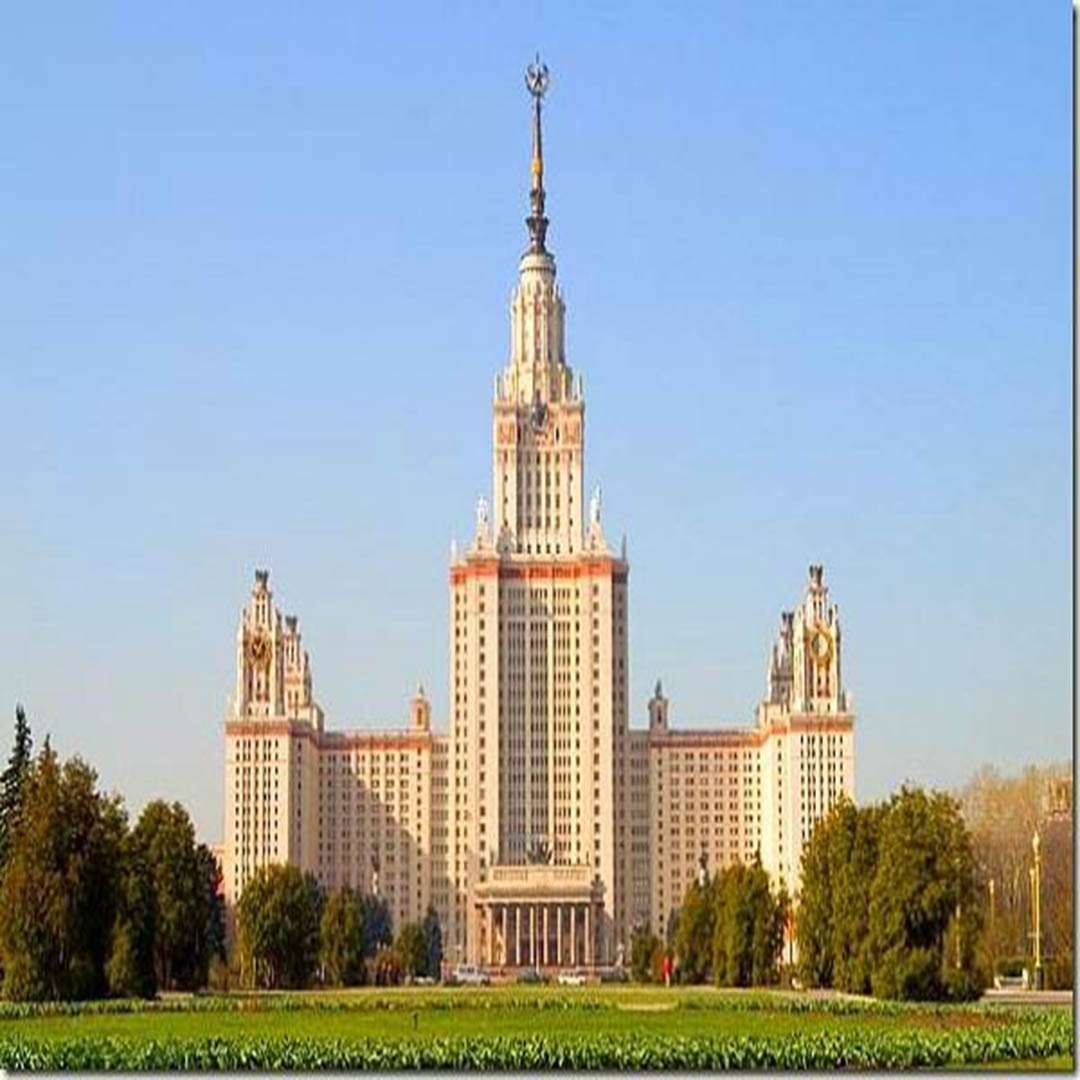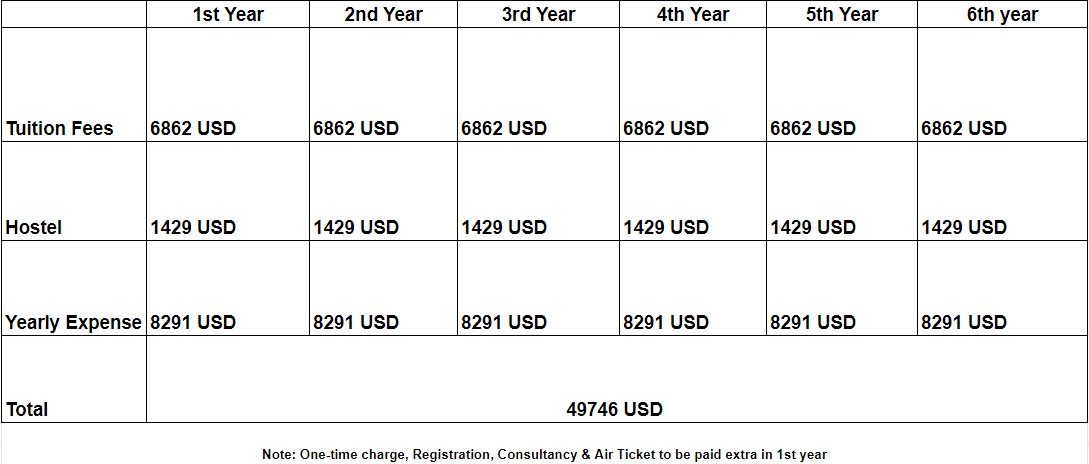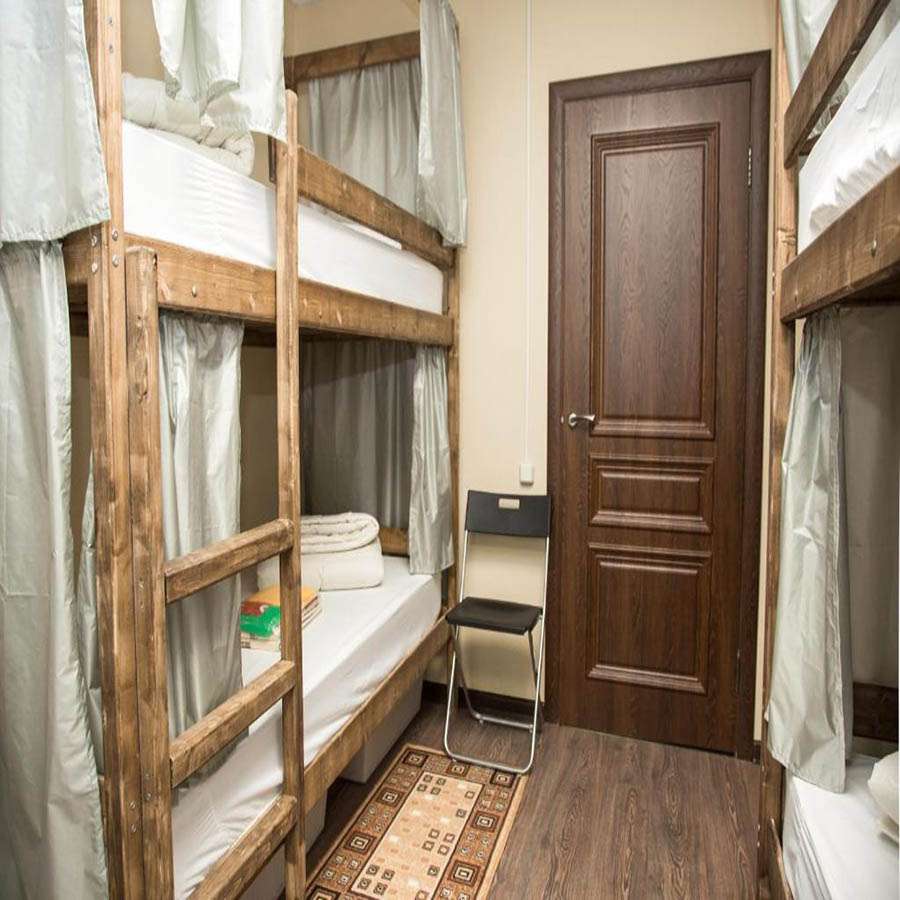

"Discover why Srishty Khera & Team Study Abroad Campus is the trusted choice for MBBS Abroad - watch our student and parent testimonials today!"

Lomonosov Moscow State University Overview
Nestled in the heart of Russia’s vibrant capital, Lomonosov Moscow State University (MSU) stands tall as a beacon of academic excellence and intellectual prowess. Established in 1755 by the renowned polymath Mikhail Lomonosov, this esteemed institution has consistently been at the forefront of innovation and education, shaping the minds of generations and leaving an indelible mark on the global academic landscape.
With its iconic main building, a testament to Stalinist architecture, gracing the skyline of Moscow, MSU embodies both tradition and modernity. Boasting a rich history spanning centuries, the university has evolved into a comprehensive educational hub, offering a diverse array of programs across various disciplines.
At the heart of MSU’s academic endeavor is its commitment to fostering critical thinking, creativity, and scholarly inquiry. Renowned for its rigorous academic standards and esteemed faculty, the university provides a stimulating environment where students are encouraged to push the boundaries of knowledge and explore new frontiers.
One of the defining features of MSU is its emphasis on research. Home to numerous research institutes and centers of excellence, the university serves as a crucible for groundbreaking discoveries and scientific advancements. From physics to biology, from humanities to engineering, MSU’s research endeavors span a broad spectrum of disciplines, contributing to the advancement of human knowledge and the betterment of society.
Moreover, MSU’s global outlook and commitment to international collaboration have made it a magnet for scholars and students from around the world. Through exchange programs, joint research initiatives, and partnerships with leading institutions worldwide, MSU fosters cross-cultural understanding and facilitates the exchange of ideas on a global scale.
Beyond academia, MSU boasts a vibrant campus life, with a plethora of extracurricular activities, cultural events, and student organizations enriching the student experience. From theatrical performances to sporting events, from art exhibitions to academic conferences, there is always something happening at MSU, ensuring that students receive a well-rounded education both inside and outside the classroom.
In conclusion, Lomonosov Moscow State University stands as a shining exemplar of academic excellence, research prowess, and intellectual vibrancy. With its storied history, world-class faculty, and dynamic student body, MSU continues to be a beacon of inspiration for scholars and seekers of knowledge worldwide, embodying the timeless pursuit of truth and wisdom.
Lomonosov Moscow State University Fee Structure 2024-25


Lomonosov Moscow State University Course Duration
Embarking on the journey of higher education is a pivotal moment in one’s life, and choosing the right institution involves weighing various factors, including course duration. At Lomonosov Moscow State University (MSU), a premier academic institution steeped in tradition and innovation, understanding the intricacies of course duration is essential for prospective students seeking to chart their academic path.
MSU offers a diverse range of undergraduate and graduate programs across a multitude of disciplines, each tailored to meet the evolving needs of students and the demands of the contemporary world. The duration of these programs varies depending on the level of study and the field of specialization.
For undergraduate studies, the typical course duration at MSU is four years for most programs. This duration allows students to delve deep into their chosen field, acquire foundational knowledge, and develop critical thinking skills essential for their academic and professional endeavors. However, certain programs, particularly in fields such as medicine and engineering, may have longer durations due to the rigorous nature of the curriculum and the extensive practical training required.
At the graduate level, MSU offers a range of master’s and doctoral programs designed to foster advanced scholarship and research excellence. Master’s programs typically span two years, providing students with the opportunity to specialize further in their field of study, engage in cutting-edge research, and prepare for leadership roles in academia, industry, or government.
Doctoral programs, on the other hand, are more intensive and may vary in duration depending on the field of study and the research undertaken. Generally, doctoral studies at MSU require a minimum of three to four years of full-time research and coursework, culminating in the completion of a doctoral dissertation that contributes original insights to the academic community.
It is worth noting that the duration of study at MSU may be influenced by factors such as individual progress, academic performance, and the requirements of specific programs. Additionally, the university offers flexibility through part-time and online learning options, allowing students to tailor their academic journey to suit their personal and professional commitments.
Beyond the classroom, MSU provides a rich and supportive learning environment, with renowned faculty, state-of-the-art facilities, and a vibrant campus community. Whether pursuing undergraduate or graduate studies, students at MSU are empowered to explore their passions, pursue their academic goals, and embark on a journey of intellectual discovery that extends far beyond the confines of the classroom.
In conclusion, course duration at Lomonosov Moscow State University reflects the institution’s commitment to academic excellence, research innovation, and student success. By offering a diverse array of programs tailored to meet the needs of students at every stage of their academic journey, MSU continues to be a beacon of inspiration for scholars and learners alike, shaping the future leaders and thinkers of tomorrow.
Eligibility Criteria by Lomonosov Moscow State University
Embarking on a journey of higher education often begins with understanding the eligibility criteria set forth by prospective institutions. At Lomonosov Moscow State University (MSU), a bastion of academic excellence and innovation, the eligibility criteria serve as a gateway for aspiring students to access world-class education and pursue their academic aspirations.
MSU offers a diverse array of undergraduate and graduate programs across various disciplines, each with its own set of eligibility requirements tailored to ensure the academic preparedness and suitability of applicants.
For undergraduate programs, eligibility criteria typically include a secondary school diploma or its equivalent, along with satisfactory performance in prerequisite subjects relevant to the chosen field of study. Additionally, international students may be required to demonstrate proficiency in the Russian language through standardized tests such as the Test of Russian as a Foreign Language (TORFL) or provide evidence of proficiency in English for programs taught in that language.
For graduate programs, eligibility criteria vary depending on the level of study and the specific requirements of each program. Generally, applicants are expected to hold a bachelor’s degree or its equivalent from a recognized institution, preferably with a strong academic record in a relevant field. Some programs may also require standardized test scores such as the GRE or GMAT, letters of recommendation, a statement of purpose, and, in certain cases, evidence of proficiency in the language of instruction.
Moreover, MSU welcomes applications from international students and offers support services to facilitate their transition to academic life in Russia. Prospective international students are encouraged to familiarize themselves with the specific eligibility criteria for international applicants, which may include additional documentation requirements such as proof of financial support and health insurance coverage.
Beyond academic qualifications, MSU values diversity, creativity, and a passion for learning. While meeting the eligibility criteria is essential, the university also considers applicants’ extracurricular achievements, community involvement, and personal qualities that contribute to a dynamic and enriching learning environment.
Aspiring students interested in pursuing their academic journey at MSU are encouraged to thoroughly review the eligibility criteria for their desired program and ensure that they meet all requirements before submitting their application. Adherence to the eligibility criteria not only enhances the chances of admission but also sets the stage for a fulfilling and rewarding academic experience at one of Russia’s most prestigious institutions.
In conclusion, the eligibility criteria at Lomonosov Moscow State University reflect the institution’s commitment to academic excellence, diversity, and inclusivity. By setting clear and transparent standards for admission, MSU opens doors of opportunity for students from diverse backgrounds to pursue their educational dreams and unlock their full potential on the global stage.
Facilities & Infrastructure at Lomonosov Moscow State University
Lomonosov Moscow State University (MSU) stands as an architectural gem nestled in the heart of Russia’s capital, its sprawling campus adorned with historic landmarks and modern amenities alike. Beyond its academic prestige, MSU boasts world-class facilities and infrastructure designed to enrich the educational experience and nurture the intellectual growth of its students and faculty.
At the heart of MSU’s campus lies its iconic main building, a towering testament to Stalinist architecture that dominates the Moscow skyline. This majestic structure not only serves as a symbol of academic excellence but also houses lecture halls, laboratories, libraries, and administrative offices essential to the university’s daily operations.
Inside the main building, students have access to state-of-the-art facilities equipped with the latest technology and resources to support their academic pursuits. Modern classrooms provide an immersive learning environment, while specialized laboratories offer hands-on experience in fields ranging from physics and chemistry to biology and engineering.
The university’s extensive library system is a treasure trove of knowledge, comprising millions of volumes, rare manuscripts, and digital resources that cater to the diverse interests and research needs of students and scholars. The main library, named after Mikhail Lomonosov himself, serves as the centerpiece of this vast network, offering quiet study spaces, research assistance, and access to online databases and journals.
Beyond academics, MSU offers a plethora of facilities to enrich the student experience and foster a sense of community on campus. Sports enthusiasts can take advantage of the university’s athletic facilities, including gyms, swimming pools, and sports fields, while cultural aficionados can explore the various museums, theaters, and art galleries scattered throughout the campus.
Residential halls provide comfortable accommodation for students, offering a vibrant community atmosphere and a supportive environment for living and learning. Dining facilities serve a diverse array of culinary delights, catering to different tastes and dietary preferences.
Moreover, MSU is committed to sustainability and environmental stewardship, with initiatives in place to reduce energy consumption, promote recycling, and preserve green spaces on campus. The university’s commitment to sustainability aligns with its broader mission of responsible citizenship and global engagement.
In addition to its physical infrastructure, MSU leverages technology to enhance teaching, learning, and research. The university’s IT infrastructure supports online learning platforms, virtual classrooms, and collaborative research tools, enabling students and faculty to connect and collaborate seamlessly across disciplines and continents.
In conclusion, the facilities and infrastructure at Lomonosov Moscow State University reflect its commitment to excellence, innovation, and holistic development. From its historic landmarks to its modern amenities, MSU provides a conducive environment where students can thrive intellectually, socially, and personally, shaping the leaders and thinkers of tomorrow in the process.
Documents Required for Admission at Lomonosov Moscow State University
Embarking on a journey of higher education at Lomonosov Moscow State University (MSU) is a pivotal moment for aspiring scholars worldwide. Understanding the documentation required for admission is the first step towards realizing academic ambitions at this esteemed institution, renowned for its academic rigor and research excellence.
MSU offers a diverse array of undergraduate and graduate programs, each with its own specific requirements. However, certain documents are universally essential for all applicants seeking enrollment at this prestigious university.
For undergraduate programs, prospective students typically need to assemble the following documents:
- Completed Application Form: This serves as the gateway to admission, providing essential personal and academic information.
- Secondary School Transcripts: Official transcripts detailing academic performance throughout secondary education are required. These transcripts should highlight achievement in relevant subjects and coursework.
- Secondary School Diploma or Certificate: A copy of the secondary school diploma or its equivalent serves as evidence of completion of secondary education.
- Language Proficiency Test Scores: Depending on the language of instruction, applicants may need to provide scores from standardized language proficiency tests such as the Test of Russian as a Foreign Language (TORFL) for programs taught in Russian, or TOEFL/IELTS for programs taught in English.
- Standardized Test Scores (if applicable): Some programs may require scores from standardized tests such as the Unified State Exam (EGE) in Russia, or international tests like the SAT or ACT.
For graduate programs, the documentation requirements may include:
- Completed Graduate Application Form: Similar to undergraduate applications, this form collects vital information from the applicant.
- Bachelor’s Degree Transcripts: Official transcripts from all post-secondary institutions attended, demonstrating academic performance and coursework relevant to the intended field of study.
- Bachelor’s Degree Certificate: A copy of the bachelor’s degree certificate or its equivalent is necessary to confirm the completion of undergraduate studies.
- Letters of Recommendation: Typically, two to three letters of recommendation from professors or professionals familiar with the applicant’s academic and/or professional background are required.
- Statement of Purpose or Personal Statement: A written statement outlining the applicant’s academic and career aspirations, as well as reasons for pursuing graduate studies at MSU.
- Standardized Test Scores (if applicable): Depending on the program, applicants may need to submit scores from standardized tests such as the GRE or GMAT.
International applicants may also need to provide additional documentation, including a copy of their passport, proof of financial support, and health insurance coverage.
Navigating the document submission process can seem daunting, but MSU provides comprehensive guidance and support to assist prospective students. Clear instructions are typically available on the university’s official website or through the admissions office, ensuring that applicants have access to all necessary information to compile and submit their documents accurately and on time.
In conclusion, assembling the required documents for admission at Lomonosov Moscow State University signifies the beginning of an exciting academic journey. By providing transparent guidelines and support services, MSU aims to make the admissions process accessible and equitable for students worldwide, fostering a diverse community of scholars committed to excellence in education and research.
Lomonosov Moscow State University Ranking 2024-25
As the academic world evolves and institutions strive for excellence, the ranking of universities serves as a barometer of their standing on the global stage. In the landscape of higher education, Lomonosov Moscow State University (MSU) continues to shine brightly, reaffirming its position as a powerhouse of intellectual prowess and innovation in the latest rankings for the academic year 2024-25.
Renowned for its rich history, rigorous academic programs, and groundbreaking research, MSU has consistently featured prominently in international rankings, garnering acclaim for its contributions to scholarship and learning. In the latest rankings, MSU once again asserts its dominance, reaffirming its status as one of the world’s leading universities.
At the forefront of MSU’s accolades is its stellar performance in academic excellence and research impact. With a faculty comprising distinguished scholars and researchers, MSU produces cutting-edge research across a broad spectrum of disciplines, from natural sciences and humanities to engineering and social sciences. The university’s commitment to innovation and discovery fuels its ascent in the rankings, cementing its reputation as a hub of intellectual inquiry and scholarly achievement.
Moreover, MSU’s global outlook and commitment to international collaboration contribute to its success in the rankings. Through strategic partnerships with leading institutions worldwide, MSU fosters cross-cultural exchange and interdisciplinary research, enriching the academic experience for students and faculty alike. The university’s internationalization efforts enhance its visibility and reputation on the global stage, further solidifying its position among the world’s top universities.
Beyond academic prowess, MSU’s ranking success is also attributed to its state-of-the-art facilities and vibrant campus life. With modern infrastructure, cutting-edge laboratories, and world-class libraries, MSU provides a conducive environment for learning, research, and innovation. The university’s commitment to student support services, cultural diversity, and extracurricular activities enhances the student experience, fostering a sense of belonging and community among its diverse student body.
As MSU continues to ascend the ranks of global academia, it remains steadfast in its mission to educate and inspire the next generation of leaders, thinkers, and innovators. The university’s unwavering commitment to excellence, coupled with its pioneering research and vibrant campus community, ensures that it will continue to be a beacon of academic distinction and intellectual enlightenment for years to come.
In conclusion, Lomonosov Moscow State University’s impressive ranking in the 2024-25 academic year is a testament to its enduring legacy of excellence and innovation. As it charts new heights in academia and research, MSU reaffirms its position as a premier destination for scholars, students, and seekers of knowledge, shaping the future of higher education and making a lasting impact on the world.
Hostel Facility at Lomonosov Moscow State University
For students embarking on their academic journey at Lomonosov Moscow State University (MSU), the hostel facility offers more than just a place to reside; it serves as a vibrant hub of community, culture, and camaraderie. Nestled within the university’s sprawling campus, the hostel provides a supportive and enriching environment where students from diverse backgrounds come together to live, learn, and grow.
MSU’s hostel facilities are designed to accommodate the diverse needs and preferences of its student population. With a range of housing options available, students can choose from single or shared rooms, each equipped with essential amenities to ensure comfort and convenience. Modern furnishings, study desks, and ample storage space create a conducive environment for academic focus and personal relaxation.
Moreover, the hostel facilities are equipped with essential amenities to meet the daily needs of students. Common areas such as lounges, kitchens, and laundry rooms promote social interaction and community bonding, fostering friendships that last a lifetime. High-speed internet connectivity enables students to stay connected with family and friends, as well as access online resources for academic and personal enrichment.
Safety and security are paramount considerations at MSU’s hostel facilities. Round-the-clock security personnel and surveillance systems ensure the safety and well-being of residents, providing peace of mind for students and their families. Additionally, dedicated staff members are available to address any concerns or emergencies, offering support and assistance whenever needed.
Beyond the physical infrastructure, the hostel experience at MSU is enriched by a vibrant community atmosphere. Students from different countries, cultures, and academic disciplines come together to share experiences, exchange ideas, and celebrate diversity. Cultural events, social gatherings, and recreational activities organized within the hostel foster a sense of belonging and camaraderie among residents, creating memories that last a lifetime.
Furthermore, the hostel facilities at MSU are strategically located within close proximity to academic buildings, libraries, and other university amenities. This convenient access allows students to easily navigate campus life, attend classes, and participate in extracurricular activities without having to travel far from their residence.
In conclusion, the hostel facility at Lomonosov Moscow State University offers much more than just accommodation; it provides a supportive and inclusive environment where students can thrive academically, socially, and personally. With modern amenities, a strong sense of community, and a commitment to student well-being, MSU’s hostel facilities truly embody the university’s ethos of excellence, innovation, and global engagement.
Admission Process for Lomonosov Moscow State University
Embarking on the journey of higher education at Lomonosov Moscow State University (MSU) is a significant milestone for aspiring scholars worldwide. Understanding the admission process is the crucial first step towards joining this prestigious institution, renowned for its academic rigor, research excellence, and rich cultural heritage.
The admission process at MSU is designed to identify and nurture the brightest minds from around the globe, ensuring a diverse and talented student body. While specific requirements may vary depending on the program and level of study, there are certain common steps that all prospective students must follow:
- Research and Choose a Program: Before applying, prospective students are encouraged to thoroughly research MSU’s academic programs and choose the one that aligns with their interests, career goals, and academic strengths. With a diverse array of undergraduate and graduate programs available, there is something for every aspiring scholar at MSU.
- Review Eligibility Criteria: Each program at MSU has specific eligibility criteria that applicants must meet. These criteria may include academic qualifications, language proficiency requirements, standardized test scores, and other documentation. Prospective students are advised to review the eligibility criteria carefully to ensure they meet all requirements before applying.
- Prepare Required Documents: Assembling the necessary documents is a crucial aspect of the admission process. Common documents required for admission may include academic transcripts, diplomas or certificates, standardized test scores, letters of recommendation, a statement of purpose or personal statement, and proof of language proficiency for international applicants.
- Submit Online Application: The next step is to complete and submit the online application through MSU’s official admissions portal. The application form collects essential personal and academic information from the applicant and allows them to specify their program of interest.
- Pay Application Fee (if applicable): Some programs at MSU may require applicants to pay an application fee as part of the admission process. This fee helps cover administrative costs associated with processing applications and is typically payable online through the admissions portal.
- Attend Entrance Exams (if required): Depending on the program and level of study, applicants may be required to take entrance exams as part of the admission process. These exams assess applicants’ knowledge, skills, and aptitude in their chosen field of study and may include written tests, interviews, or portfolio reviews.
- Await Admission Decision: Once all required documents have been submitted and any entrance exams have been completed, applicants must wait for the admission decision. MSU’s admissions committee carefully reviews each application, taking into account academic qualifications, test scores, letters of recommendation, and other factors before making a final decision.
- Accept Admission Offer and Complete Enrollment: Upon receiving an admission offer, successful applicants must accept the offer and complete the enrollment process according to the instructions provided by MSU. This may include paying tuition fees, securing housing arrangements, and attending orientation sessions for new students.
Throughout the admission process, MSU provides support and guidance to prospective students, ensuring a smooth and transparent experience from application to enrollment. Dedicated admissions officers are available to answer questions, provide assistance, and help applicants navigate any challenges they may encounter along the way.
In conclusion, the admission process at Lomonosov Moscow State University is a gateway to academic excellence and personal growth. By following the steps outlined above and meeting all requirements, aspiring scholars can embark on a transformative educational journey at one of Russia’s most prestigious institutions, laying the foundation for a successful and fulfilling career in their chosen field.
Lomonosov Moscow State University Photos




Lomonosov Moscow State University MBBS Syllabus
Lomonosov Moscow State University (MSU) stands as a beacon of academic excellence, particularly in the field of medicine, where it offers a comprehensive MBBS program designed to produce competent and compassionate healthcare professionals. Aspiring medical students who choose MSU embark on a journey that not only equips them with the knowledge and skills required for medical practice but also instills in them a deep sense of responsibility and dedication to the health and well-being of their patients.
The MBBS syllabus at MSU is carefully crafted to cover a broad range of subjects essential for medical practice, providing students with a solid foundation in both theoretical knowledge and practical skills. While specific courses and topics may vary slightly from year to year, depending on advancements in medical science and evolving healthcare needs, the core curriculum typically includes the following:
- Pre-Clinical Subjects: The MBBS program at MSU usually begins with a focus on pre-clinical subjects, laying the groundwork for understanding the basic principles of anatomy, physiology, biochemistry, and medical genetics. These foundational courses provide students with a comprehensive understanding of the structure and function of the human body, essential for subsequent clinical training.
- Clinical Subjects: As students progress through the program, they transition to clinical subjects, which delve deeper into the diagnosis, treatment, and management of various medical conditions. Clinical rotations in disciplines such as internal medicine, surgery, pediatrics, obstetrics and gynecology, psychiatry, and more allow students to apply their theoretical knowledge in real-world clinical settings under the guidance of experienced faculty members and healthcare professionals.
- Integrated Courses: MSU’s MBBS syllabus emphasizes an integrated approach to medical education, where students learn to connect concepts from different disciplines and apply them to clinical practice. Integrated courses may cover topics such as pathophysiology, pharmacology, microbiology, immunology, and epidemiology, providing students with a holistic understanding of disease processes and their management.
- Elective Courses and Research Opportunities: In addition to core coursework, MSU offers elective courses and research opportunities that allow students to explore specialized areas of interest within the field of medicine. These electives may include topics such as medical ethics, public health, global health, medical informatics, and more, providing students with the flexibility to tailor their educational experience to suit their career goals and interests.
- Practical Training and Clinical Rotations: Practical training and clinical rotations are integral components of the MBBS program at MSU, allowing students to gain hands-on experience in diverse clinical settings, including hospitals, clinics, and community health centers. Under the supervision of experienced physicians and healthcare professionals, students learn to perform clinical examinations, diagnose medical conditions, develop treatment plans, and communicate effectively with patients and their families.
Throughout the MBBS program, MSU emphasizes the importance of professionalism, ethics, communication skills, and cultural competence, preparing students to excel not only as competent clinicians but also as compassionate caregivers who prioritize the holistic well-being of their patients.
In conclusion, the MBBS syllabus at Lomonosov Moscow State University reflects the institution’s commitment to excellence in medical education and research. By providing a comprehensive curriculum, hands-on clinical training, and opportunities for specialization and research, MSU prepares its graduates to meet the challenges of modern healthcare with confidence, compassion, and competence, ensuring a brighter and healthier future for generations to come.
Important FAQs
Ans: MSU offers a wide array of undergraduate, graduate, and doctoral programs across various fields, including natural sciences, humanities, social sciences, engineering, medicine, and more. Prospective students can explore the university’s website or contact the admissions office for a comprehensive list of available programs.
Ans: Eligibility criteria vary depending on the program and level of study. Generally, undergraduate applicants are required to have a secondary school diploma or its equivalent, while graduate applicants must hold a bachelor’s degree or its equivalent. Language proficiency tests and standardized test scores may also be required for certain programs.
Ans: MSU offers various scholarships, grants, and financial aid options for both domestic and international students. These may include merit-based scholarships, need-based scholarships, and government-sponsored scholarships. Prospective students are encouraged to explore available opportunities and contact the financial aid office for more information.
Ans: MSU offers comprehensive support services for international students, including assistance with visa applications, orientation programs, language courses, academic advising, and cultural integration activities. The university is committed to ensuring that international students feel welcome and supported throughout their time at MSU.
Ans: Prospective students can apply to MSU by completing and submitting an online application through the university’s official admissions portal. The application form collects essential personal and academic information, and applicants must also submit required documents such as transcripts, test scores, and letters of recommendation.

